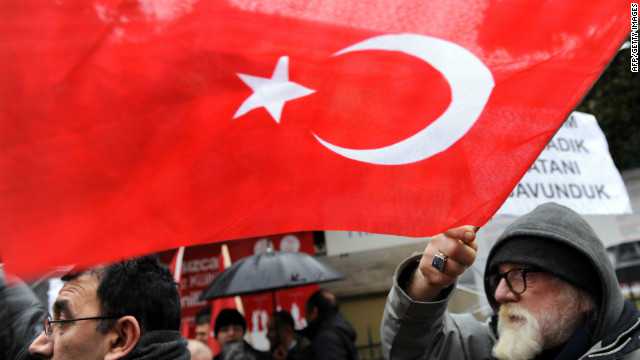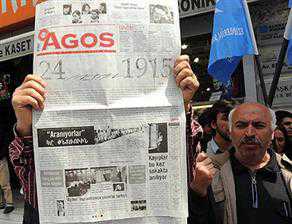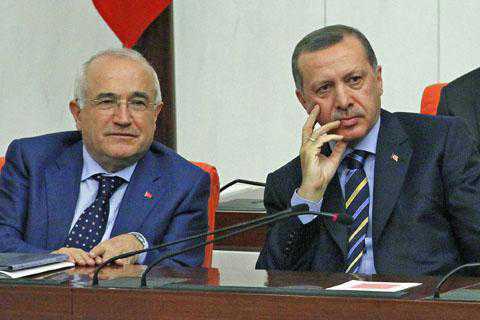30 October 2011, Sunday / ALI ASLAN KILIÇ, ANKARA
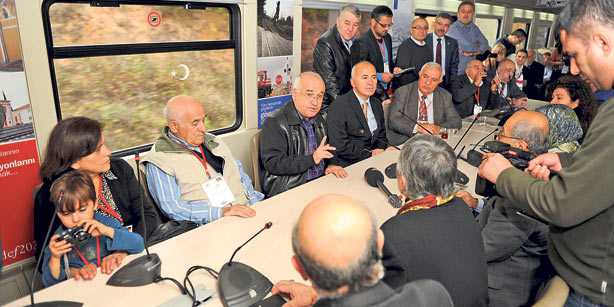
Turkish Parliament Speaker Cemil Çiçek met with the migrants in the commemorative train that set off to Germany to mark the 50th anniversary since the first group of Turks left their homeland for a new life in Germany as part of a labor agreement signed by the two countries. (Photo: AA)
I have spent most of the week traveling between İstanbul and Munich. This was an extraordinary trip that I am unlikely to have again.
The Turkey-Munich train journey sponsored by the Turkish State Railways (TCDD) and organized by the Turkish Radio and Television Corporation (TRT) to mark the 50th anniversary of the first wave of Turkish migration to Germany featured unforgettable memories.
This was in fact a remembrance of the forgotten people and citizens. The Turkey-Germany train ride was a symbol of the message: “We have forgotten you for five decades, but we have not totally abandoned you. We have failed to respond to your demands and problems, but now, we are there for you as the state.”
We, the parliament speaker, deputies, artists, writers, bureaucrats and journalists, heard the emotions and thoughts of our workers and tried to better understand them.
The number two of the state, Cemil Çiçek, who joined the trip for the Belgrade leg of the journey, made a concise statement: “Both we, Turkey, and the countries hosting our workers, including Germany Austria, France, Holland and Belgium, have to make a thorough evaluation.” Neither Turkey nor Germany or other countries were aware of the outcome of a labor exchange agreement that they signed 50 years ago. The culture shock to be experienced by the people who were moving towards uncertainty out of hope for a better future, the problems they would encounter, their demands of their children and expectations were not considered back then. In a way, Turkey sent these people and forgot about them, while Germany thought they would stay temporarily and then go back to their home country.
However, this did not happen. Hasibe Altun, who moved to Germany assuming that she would come back one year later, said she had been there for 41 years, bringing to light the reality that the German and Turkish governments failed to address.
I wish the Turkey-Germany train could have made the journey on the 10th, 20th and 25th anniversaries of the migration so that this would have served as an opportunity to identify the problems and negligence as well as address the problems of the guest workers before I was too late.
On the train, hopes, negligence, sadness and homesickness were expressed and voiced. In addition to the sadness associated with having been forgotten for five decades, these people also expressed their happiness at being remembered. The attendants cried out of sadness and the feeling of being a guest worker was eloquently articulated by TRT artists Zeynep Cihan and Metin Altun through heart-rending folk songs. Writers Ayla Kutlu and Nazlı Eray discussed the notion of being an immigrant and guest worker as well as the relation between an individual and the place.
People from different social and ethnic backgrounds, with different feelings and emotions, focused on the same issue during the five-day trip. Diversity should be celebrated. It is pleasant to become acquainted despite differences. We traveled through many villages and towns, as well as the cities of Sofia, Belgrade, Zagreb and Salzburg and breathed in the beauty of the nature in the fall. It was an unforgettable trip. The best part was that the people who traveled five decades ago were now confident in themselves and what they would be able to achieve because both Turkey and Germany were aware of them. They have already left their troubles behind and are ready to embrace the future.
Thanks to TRT and the TCDD, and thanks to everyone who contributed to this endeavor.
via A talk with Turkish guest workers on Turkey-Germany train.
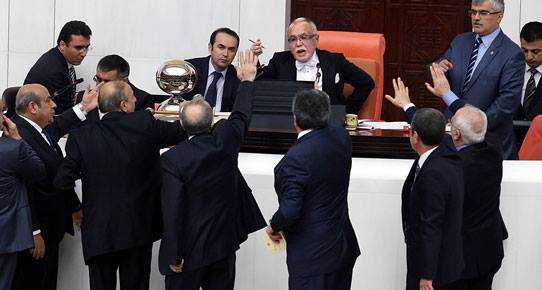 Today, we witnessed a historical day at Turkish Parliament. Police reports about 4 AKP ministers were sent to the Parliament by the public prosecutor. These reports were related to the latest corruption scandal of AKP government. Since ministers have immunity, public prosecutor cannot order police to arrest them but prepare official reports and send these reports to the Parliament. In the Parliament, ministers discuss the situation of accused ministers by considering police reports. But this process was impeded by AKP senators today by using various ways.
Today, we witnessed a historical day at Turkish Parliament. Police reports about 4 AKP ministers were sent to the Parliament by the public prosecutor. These reports were related to the latest corruption scandal of AKP government. Since ministers have immunity, public prosecutor cannot order police to arrest them but prepare official reports and send these reports to the Parliament. In the Parliament, ministers discuss the situation of accused ministers by considering police reports. But this process was impeded by AKP senators today by using various ways.
